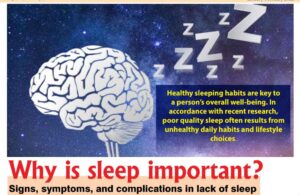Healthy sleeping habits are key to a person’s overall well-being. Research shows that getting enough quality sleep at the right times is vital for psychological well-being, as well as physical well-being. Poor quality sleep often results from unhealthy daily habits and lifestyle choices.


In order to function properly throughout the day, most of us require around 8 hours of good quality sleep. Some might need a little more than that and some, less based on their age. Sleep is an important function leaving the mind and therefore the body refreshed and recharged once we awaken. Humans need sleep like they need food, water, and air to survive. It doesn’t hurt your health to have a few sleepless nights. More than a few, though, and you’ll see mental effects such as foggy thinking, making it difficult to concentrate, poor decision making, etc. You’ll feel low, and may even fall asleep during the day. At home, at work, and on the road, your risk of injury and accidents will also increase.
Sleep deprivation is ubiquitous in the modern world, especially with the pandemic and the subsequent lockdowns. Research shows that getting enough quality sleep at the right times is vital for psychological well-being, as well as physical well-being. In addition to affecting cognitive and emotional functions, studies have shown that sleep deprivation can also cause mental health concerns such as depression, anxiety, and other sleep-related issues. Sleep deficiency is not always noticed and can seriously affect your daily routine.
Sleep deprivation can be classified into three types;
1. Acute Sleep deprivation is a short-term sleep issue, primarily a reduction in sleep time, that occurs for a short period of time.
2. A person suffering from Chronic Sleep Deprivation, also known as insufficient sleep Syndrome goes without sleep for more than three months.
3. A person with chronic sleep deficiency or insufficient sleep generally suffers from disruptions in rest, sleep fragmentation along sleep deprivation.
It is possible that children with sleep deficiency exhibit different symptoms than adults. In children, sleep deficiency may manifest as over activity and problems paying attention, outbursts, and misbehaviour, in addition to problems with school performance.
Sleep deprivation can have several signs and symptoms, some of the symptoms are:
1. Fatigue: The most common sign of fatigue is feeling drowsy and physically exhausted after waking up in the morning; one might be tempted to go back to sleep.
2. Inability to Focus: Making decisions and solving problems can also seem difficult if you do not have the ability to focus. Similarly, remembering things and memory are also affected.
3. Mood Changes: We often experience severe mood changes, where we feel irritable and aggravated the whole day when we don’t get enough sleep.
4. Reduced Sex Drive: Sleep deprivation leads to low libido in many people.
5. Weight: Sleep may impact the hormones responsible for controlling feelings of hunger and fullness. You must sleep well in order to maintain a healthy weight. In the absence of sleep, you are likely to gain fat, gain weight, and develop type 2 diabetes.
Also Read: Sleeping build’s better and strong immunity : Understand the science of good sleep
Best practices for a good night sleep
Healthy sleeping habits are key to a person’s overall well-being. Often, sleep is overlooked or neglected. As we strive to function through the day without any difficulty, we should be aware of our sleep schedule and pattern and reach out for help if we feel any discomfort. In accordance with recent research, poor quality sleep often results from unhealthy daily habits and lifestyle choices. However, by following these tips you could experience some restful sleep and improve your overall health and well-being.
1. The first strategy is to stick to your sleep pattern and to get in sync with your body’s natural sleep-wake cycle, even during the weekends.
2. Control your exposure to light. During the day, expose yourself to more natural light and bright sunlight in the morning. And during the night, avoid bright screens within 1-2 hours of your bedtime. Which means no television, too.
3. Exercise during the day. Additionally to accelerating your metabolism and increasing your body temperature, it will also elevate your mood. However, do not work out vigorously 3 hours before bedtime.
4. Be mindful of what you consume through the day and close to your bedtime too. Sugar, white rice, pasta can trigger wakefulness at night. Likewise, try avoiding caffeine and alcohol at least 6 hours prior to bedtime.
5. Sleeping well can be very difficult when you are stressed, worried, and angry from your day. It is important to clear your mind and wind down before you hit your bed. Try developing and practicing a relaxation technique, taking a warm bath, and listening to soft music. Make relaxation your goal, not sleep!


Saadhvi Raju
Counselor & Psychotherapist
Medall Mind, Bengaluru










